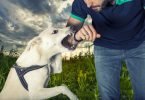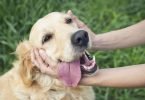Our weight changes over time according to different circumstances. And just like us, our pets also gain or lose weight. Here we are going to discuss weight loss in our friendly companions, our dogs. The weight of dogs also varies throughout their lifetime. It may depend on various factors such as age, breed, nutrition and other health conditions they may have. And for your dog losing weight unexpectedly, it causes great concern.
Cause of sudden weight loss in dogs
Sometimes dog eats and drinks well as they usually do, and its urine and bowel movements are also normal. Apart from that, it loses weight. It, no doubt, worries you. One of the underlying causes maybe your dog is more active these days and is burning more calories. To make it simple, the following are the reasons for the excessive use of calories:
- Fever or inflammation
- Prolonged exposure to the cold environment
- Increased physical activity
- Pregnancy or lactation
The dog also loses weight if you feed low-quality food, or it is not getting enough nutrition. An insufficient quantity of food doesn’t provide enough calories. Also, prolonged storage of food deteriorates nutrients. Weight loss is not normal if there is no change in its diet and activity level.
Signs of malnourishment include:
- Susceptibility to illness
- Low energy levels
- Physical appearance i-e, shoulders, and bones of ribs become visible
- Gastrointestinal issues
Some other underlying causes of weight loss in dogs include:
Dental problems
Starting from the beginning of the food intake process, the first thing that comes to our mind is the mouth. And one of the simplest reasons for dog losing weight is its dental problems. Contact your vet if your dog is suffering from swollen gums, broken teeth or you find pus discharge when you press its gums.
Anxiety
Don’t get surprised! As stress deprives us of appetite and other healthy activities, anxiety is also exhausting for dogs. How do you know if your dog is suffering from anxiety? Well, some signs include:
- Destructive tendencies, chewing, digging
- Urinating or defecating in the home
- Incessant howling or barking
Excessive urination, diarrhea or vomiting can cause excessive loss of nutrients. And as discussed earlier, loss of nutrients results in weight loss.
Diabetes
Unfortunately, like humans, diabetes is a common condition in dogs. And diabetes in dogs is no different than humans. Even though a low insulin level and inability to absorb sugar from the blood increases the appetite of the dog, but the dog still loses weight. Apart from appetite, diabetes also increases thirst and hence urination. The dog will be unable to hold its urine all night. And such accidents are symptoms of diabetes in dogs, despite being house-trained. Diabetes is mostly diagnosed in older dogs, usually females. Along with the dog losing weight, it also loses its muscle mass due to diabetes.
Now that you know three symptoms, excessive thirst, urination, and weight loss are going side by side. It is important to contact your vet and have your dog checked.
Cancer
We all are well aware of the deadly characteristics of cancer. It strikes in many different ways. One of the reasons that your dog is losing weight, along with lots of muscle mass, might be cancer. Tumors draw away all the nutrients that dogs need. The sooner you diagnose and treat cancer, the better.
Liver disease
One of the reasons for your dog to lose weight is liver disease. Generalized lethargy, vomiting, anorexia and sudden weight loss bring vet’s attention towards liver disease. If your dog is suffering from liver disease, it doesn’t get the essential nutrients the liver provides. This results in loss of sugar and essential carbs and to fulfill the needs. The body starts consuming fat deposits and muscle mass. Thus, leading to your dog losing weight.
Some other symptoms of liver disease in dogs include:
- Increased thirst followed by an increased need to urinate
- Diarrhea or vomiting
- Yellowish eyes, tongue, and gums
- Loss of appetite and weight loss
- Confusion
- Blood in urine or stool
Kidney disease
Chronic renal failure is a serious and chronic problem in dogs. In this condition, the dog’s kidneys don’t work effectively and are unable to perform metabolic and excretory functions. Protein-losing nephropathy is a condition in which protein molecules are not used by the body and are excreted out through urine. This causes a low level of protein in the dog’s body despite the amount of food that the dog eats. Some signs of chronic renal failure include:
- Vomiting
- Diarrhea
- Lethargy
- Weight loss
Chronic renal failure often affects older dogs.
Cardiac cachexia
Many dogs with heart disease develop congestive heart failure (CHF). And dogs with congestive heart failure undergo a process called cardiac cachexia. During this process, both fat stores and muscles are depleted. Your dog may eat normally but continue to lose weight. Weight loss occurs due to metabolic changes, lack of nutrient absorption and increased need for energy. Hence, weakness and lethargy occur. The weight loss also affects the immune system and the risk of infection. Cachexia is a loss of body mass and is called cardiac cachexia when accompanied by congestive heart failure.
Maldigestion/Malabsorption
Even though the dog is eating well, it loses weight. Maldigestion/Malabsorption can cause a dog to lose weight.
Megaesophagus is a condition in which the dog’s body doesn’t fully digest and absorb food. The esophagus of dog swells and becomes enlarged. It malfunctions and doesn’t transport food to the stomach effectively. The secondary sign of this condition is your dog losing weight.
Another reason that causes maldigestion/malabsorption is the destruction of the pancreas. Due to which no enzymes are released into the gastrointestinal tract of your dog. As a result, all the essential nutrients that your dog gets through food is not absorbed.
Bacterial overgrowth in small intestines causes diarrhea in dogs, which eventually results in weight loss.
Parasites and Infection
The dog will suddenly lose weight if it has an internal parasite such as tapeworm. It will lack nutrients because worms consume all the food eaten by dogs. Your vet may prescribe you some medicines that will help your dog get rid of those pesky parasites.
Thyroid problems
Just like our body, the dog’s body is also controlled by hormones. One of the reasons for sudden weight loss in your dog could be due to thyroid issues. Hyperthyroidism results in rapid metabolism and no matter how much your dog eats, it loses its weight.
Diagnosis of Dog Losing Weight
Although light yellow stools and diarrhea are signs of maldigestion and malabsorption that causes weight loss, other diseases can also cause weight loss. Thus these symptoms are not enough to diagnose a problem. Since weight loss confirmation is necessary, physical examination with a thorough history and appropriate diagnostic tests are required. Some diagnostic tests include:
- Chest and abdominal X-rays
- Complete Blood count
- Stool examination
- Biochemical profile
- Urine analysis
Dog weight loss symptoms
To sum up, the symptoms that your dog is losing weight are:
- Weight loss
- Loss of muscle mass
- Poor hair coat
- Vomiting
- Diarrhea
- Regurgitation
Treatment for dog losing weight
When your dog is losing weight, treatment depends on the cause of weight loss. Because weight loss can be due to many chronic underlying diseases, contact your vet immediately. Once the exact cause is diagnosed, your vet will advise you on the optimal schedule for your dog. However, some treatment options include:
- Appetite stimulants
- Appropriate exercise regime
- Stress-free environment
- Supplements along with vitamins and minerals
- Intravenous nutrition for dogs that can’t take food orally
Your vet can also prescribe some medicines depending on the cause of weight loss. Administer those medicines and diet precisely as directed.
Prognosis varies depending on the dog’s specific diagnosis. Your vet will require a thorough medical history, physical examination, and diagnostic testing to determine both the prognosis and treatment for your dog, who is losing weight.
The Dog is losing weight and hair
Weight and hair loss often occur together because of some underlying medical conditions. These medical conditions are also mentioned above such as cancer, kidney disease, liver disease. Apart from that, excessive shedding is also caused by poor nutrition, stress, pregnancy, and lactation. Bacterial and fungal infections also cause hair loss. Also, keep it in mind that hair loss is also seasonal.
Senior dog losing weight
Experiencing your dog aging is a mixture of sadness and happiness. And it also concerns you when you see changes in their physique. However, a lot of these changes are usual that occur with age. Of these symptoms, an old dog losing weight and muscle mass is common. The possible causes of weight and muscle loss in senior dogs include age, wrong diet, decreased exercise, reduced appetite, poor absorption and digestion of food as well as other serious underlying cause that has been discussed above.
Care requirements for senior dogs differ from others. To provide the best possible care, you need to do things a bit differently. Here are some of the tips that will help your senior dog:
- Although as your dog gets older, it also gets slower due to low energy levels. Ask your vet for an appropriate exercise program for your dog and start slowly. This will benefit the overall health of your dog and help maintain an ideal weight.
- A balanced diet is essential to maintain the overall health of your dog. Choose a diet appropriate for the dog’s age and health condition. Diet must contain all the required nutrients. Also, fortify your dog’s diet rich in fatty acids such as EPA and DHA. These are helpful for dogs with arthritis or joint issues. Similarly, a diet with low sodium content is recommended for dogs with heart disease and diet which helps control calcium, phosphorus, and other electrolyte levels are given for kidney disease.
- Maintain oral health and provide your dog with good dental care. This is an important part of grooming and should be done regularly. Don’t forget about vaccination and parasite protection. Though your grown-up dog doesn’t require them at the same intervals as before, you should consult your vet. Likewise, regular vet care is very important because as dog’s age, they are also prone to many ailments. Therefore, save your dog from such misery by providing the best possible treatment for your dog.
- Last but not least, also provide your senior dog with special accommodation—for instance, soft bedding benefits old dogs with arthritis. Use ramps to make it easier for them to go up the stairs. You can also provide carpet or rugs or any other type of soft covering over hard surface flooring.
Best dog food to gain weight and muscle
If you own a dog losing weight, you need to bulk him up. But this doesn’t mean that you only increase the quantity of dog food. Your dog requires a diet that includes all the essential nutrients and that provides an appropriate amount of calories that your dog needs.
There are many weight gain supplements available in the market. Do consult your vet before giving any weight to gain food for your dog. Given below is a list of some of the best products:
Best Weight Gain Food For Dogs | |||
Product Name | Nature’s Logic Dry Dog Food | Crave Grain Free Dog Food | Bully Max High-Performance Super Premium Dog Food |
Description |
|
|
|
Pros |
|
|
|
Cons |
|
|
|
Conclusion
If you are concerned that your dog is losing weight, we have provided you with appropriate information about a dog losing weight, its symptoms, causes, and treatment. We have also got you covered on weight loss in senior dogs. Optimal treatment for your dog depends on both professional as well as home care. Some of the best food products are mentioned that you can give your dog to gain weight and muscle. However, if your dog still doesn’t get any better, follow-up checkups are crucial.






